Lexis Supplementi
Studi di Letteratura Greca e Latina | Studi di Filosofia Antica |
Fonti, testi e commenti
open access
| peer reviewed
Presentazione
The series mainly includes original studies devoted to classical literature and the classical heritage in the medieval and modern literary civilization, as well as collections of writings by philologists of recognized international value. It is also open to philosophical and historical studies with a strong focus on textual sources.
Permalink doi.org | e-ISSN 2724-3362 | ISSN 2210-8866 | Lingua en, es, fr, it |
Sottoserie
Fonti, testi e commenti
e-ISSN
2784-9937
ISSN
2784-9287
Studi di Filosofia Antica
e-ISSN
2784-9759
ISSN
2784-9201
Studi di Letteratura Greca e Latina
e-ISSN
2724-0142
ISSN
2724-377X
Copyright This is an open-access work distributed under the terms of the Creative Commons Attribution License (CC BY). The use, distribution or reproduction is permitted, provided that the original author(s) and the copyright owner(s) are credited and that the original publication is cited, in accordance with accepted academic practice. The license allows for commercial use. No use, distribution or reproduction is permitted which does not comply with these terms.
Ultimo volume pubblicato

- Venanzio Fortunato tra il Piave e la Loira
- Atti del terzo Convegno internazionale di studi
- Edoardo Ferrarini, Donatella Manzoli, Paolo Mastandrea, Martina Venuti
- 21 Gennaio 2026
Pellegrino della parola, il poeta e agiografo Venanzio Fortunato lascia la sua terra veneta per giungere nelle corti della Gallia merovingia, e lì diventa protagonista di una nuova stagione della poesia, sperimentata persino nella prosa agiografica. Questo volume raccoglie, riviste per la pubblicazione, le relazioni presentate al Convegno internazionale di studi Venanzio Fortunato tra il Piave e la Loira, tenutosi a Treviso (Casa dei Carraresi), dal 16 al 18 maggio 2024: attraverso inedite indagini filologiche, letterarie e storiche, il convegno si è rivelato un’occasione preziosa per interrogarsi su un autore che attinse con originalità, rigore formale ed estro visionario alla cultura latina classica e tardoantica per farsi interprete di un mondo in cambiamento.
- 19 download 195 search
- 1 • Un antico usus emendandi: integrazione e correzione con parola-segnale
- Illuminare i testi
- 14 download 157 search
- 2 • Parole-segnale a margine in manoscritti dal quarto al quindicesimo secolo
- Illuminare i testi
- 5 download 260 search
- 3 • Parole-segnale in linea e interlinea in manoscritti dal nono al quindicesimo secolo
- Illuminare i testi
- 8 download 186 search
- 4 • La riscoperta della parola-segnale in edizioni e studi moderni
- Illuminare i testi
- 9 download 217 search
- 5 • La parola-segnale come criterio di scelta fra diverse proposte testuali
- Illuminare i testi
- 25 download 331 search
- 6 • Proposte testuali suggerite dalla parola-segnale
- Illuminare i testi
- 6 download 26 search
- Ut pictura poesis: strategie ‘intervisuali’ nei carmina figurata di Venanzio Fortunato
- Massimo Manca
- 21 Gennaio 2026 | Venanzio Fortunato tra il Piave e la Loira
- 6 download 24 search
- Barbaries e Romania. Uno sguardo su cittadinanza e inclusione alle spalle di Venanzio Fortunato
- Carlo Pelloso
- 21 Gennaio 2026 | Venanzio Fortunato tra il Piave e la Loira
- 5 download 27 search
- Fortunatus agricola? Una lettura dell’epistola di dedica della Vita Martini
- Edoardo Ferrarini
- 21 Gennaio 2026 | Venanzio Fortunato tra il Piave e la Loira
- 2 download 25 search
- Architectures et paysages dans les Carmina de Venance Fortunat : quelques remarques sur la construction visuelle des images poétiques
- Gaëlle Herbert de la Portbarré-Viard
- 21 Gennaio 2026 | Venanzio Fortunato tra il Piave e la Loira
- 10 download 27 search
- Bibliografia generale
- 21 Gennaio 2026 | Venanzio Fortunato tra il Piave e la Loira
- 5 download 29 search
- Dal tramonto all’alba di una civiltà letteraria
- Paolo Mastandrea
- 21 Gennaio 2026 | Venanzio Fortunato tra il Piave e la Loira
- 6 download 23 search
- Eroi, filosofi, poeti: figure di Greci nella poesia di Venanzio Fortunato
- Martina Venuti
- 21 Gennaio 2026 | Venanzio Fortunato tra il Piave e la Loira
- 3 download 26 search
- Gli schemi degli epitafi poetici di Venanzio Fortunato come modello generativo
- Francesco Stella
- 21 Gennaio 2026 | Venanzio Fortunato tra il Piave e la Loira
- 9 download 31 search
- Introduzione
- Edoardo Ferrarini, Donatella Manzoli, Paolo Mastandrea, Martina Venuti
- 21 Gennaio 2026 | Venanzio Fortunato tra il Piave e la Loira
- 8 download 26 search
- Le propempticon ad libellum de la Vita sancti Martini : vers une nouvelle tradition de l’itinéraire?
- Laure Chappuis Sandoz
- 21 Gennaio 2026 | Venanzio Fortunato tra il Piave e la Loira
- 5 download 25 search
- L’opera di Venanzio tra letteratura e storia
- Rossana Barcellona
- 21 Gennaio 2026 | Venanzio Fortunato tra il Piave e la Loira
- 5 download 27 search
- Prefazione
- Luigi Garofalo
- 21 Gennaio 2026 | Venanzio Fortunato tra il Piave e la Loira
- 3 download 23 search
- Roma antica negli scritti di Venanzio Fortunato
- Stefano Di Brazzano
- 21 Gennaio 2026 | Venanzio Fortunato tra il Piave e la Loira
- 3 download 24 search
- Venance Fortunat hagiographe
- Sylvie Labarre
- 21 Gennaio 2026 | Venanzio Fortunato tra il Piave e la Loira
- 8 download 26 search
- Venanzio Fortunato patriis vagus exul ab oris
- Tiziana Brolli
- 21 Gennaio 2026 | Venanzio Fortunato tra il Piave e la Loira
- 7 download 34 search
- Venanzio Fortunato e la rappresentazione di sé: tra modestia retorica e realismo comico
- Ornella Fuoco
- 21 Gennaio 2026 | Venanzio Fortunato tra il Piave e la Loira
- 4 download 25 search
- Venanzio Fortunato in Pontano?
- Antonietta Iacono
- 21 Gennaio 2026 | Venanzio Fortunato tra il Piave e la Loira
- 7 download 30 search
- Venanzio Fortunato: poesia e non poesia?
- Donatella Manzoli
- 21 Gennaio 2026 | Venanzio Fortunato tra il Piave e la Loira
- 6 download 36 search
- 1.1 • Epos e Tragedia
- 22 Dicembre 2025 | L’‘Omero tragico’: Sofocle e Omero
- 2 download 41 search
- 1.2 • Sofocle e Omero
- 22 Dicembre 2025 | L’‘Omero tragico’: Sofocle e Omero
- 2 download 35 search
- 2.1 • Aiace: parodo (vv. 134-200)
- 22 Dicembre 2025 | L’‘Omero tragico’: Sofocle e Omero
- 1 download 26 search
- 2.2 • Aiace: primo stasimo (vv. 596-645)
- 22 Dicembre 2025 | L’‘Omero tragico’: Sofocle e Omero
- 1 download 26 search
- 2.3 • Aiace: secondo stasimo (vv. 693-718)
- 22 Dicembre 2025 | L’‘Omero tragico’: Sofocle e Omero
- 1 download 28 search
- 2.4 • Aiace: terzo stasimo (vv. 1185-222)
- 22 Dicembre 2025 | L’‘Omero tragico’: Sofocle e Omero
- 1 download 26 search
- 3.1 • Trachinie: parodo (vv. 94-140)
- 22 Dicembre 2025 | L’‘Omero tragico’: Sofocle e Omero
- 2 download 32 search
- 3.2 • Trachinie: primo stasimo (vv. 497-530)
- 22 Dicembre 2025 | L’‘Omero tragico’: Sofocle e Omero
- 1 download 23 search
- 3.3 • Trachinie: secondo stasimo (vv. 633-62)
- 22 Dicembre 2025 | L’‘Omero tragico’: Sofocle e Omero
- 2 download 24 search
- 3.4 • Trachinie: terzo stasimo (vv. 821-61)
- 22 Dicembre 2025 | L’‘Omero tragico’: Sofocle e Omero
- 0 download 26 search
- 3.5 • Trachinie: quarto stasimo (vv. 947-70)
- 22 Dicembre 2025 | L’‘Omero tragico’: Sofocle e Omero
- 3 download 34 search
- 4 • Appendice
- 22 Dicembre 2025 | L’‘Omero tragico’: Sofocle e Omero
- 2 download 31 search
- 5 • Conclusioni
- 22 Dicembre 2025 | L’‘Omero tragico’: Sofocle e Omero
- 15 download 37 search
- Premessa e ringraziamenti
- 22 Dicembre 2025 | L’‘Omero tragico’: Sofocle e Omero
- 4 download 29 search
- Loci similes
- 18 Dicembre 2025 | Querolus siue Aulularia
- 5 download 31 search
- Commento
- 18 Dicembre 2025 | Querolus siue Aulularia
- 7 download 35 search
- Introduzione
- 18 Dicembre 2025 | Querolus siue Aulularia
- 13 download 43 search
- Premessa
- 18 Dicembre 2025 | Querolus siue Aulularia
- 10 download 36 search
- Testo critico e traduzione
- 18 Dicembre 2025 | Querolus siue Aulularia
- 8 download 96 search
- Competing Grammars and Language Change: Evidence from Correction and Revision Processes in the Private Papyri from Ptolemaic Egypt
- Carla Bruno
- 24 Aprile 2025 | Everyday Communication in Antiquity: Frames and Framings
- 11 download 130 search
- Connecting Intersubjectivity, Politeness and Stance with Wishes in the Post-Classical Greek Papyri
- Ezra la Roi
- 24 Aprile 2025 | Everyday Communication in Antiquity: Frames and Framings
- 20 download 107 search
- Exploring Frame-Based Approaches to Everyday Communication in Antiquity
- Klaas Bentein
- 24 Aprile 2025 | Everyday Communication in Antiquity: Frames and Framings
- 7 download 99 search
- Frames, Framings and Beyond
- Klaas Bentein, Marianna Thoma
- 24 Aprile 2025 | Everyday Communication in Antiquity: Frames and Framings
- 9 download 96 search
- Framing the Bad Guys: Continuative Clauses in the Depiction of the Wrongdoer in Papyrus Petitions
- Eleonora Cattafi
- 24 Aprile 2025 | Everyday Communication in Antiquity: Frames and Framings
- 31 download 135 search
- Medium, Procedures and Conventions
- Serena Causo
- 24 Aprile 2025 | Everyday Communication in Antiquity: Frames and Framings
- 11 download 104 search
- Requests in the Qurra Dossier
- Fokelien Kootstra-Ford, Klaas Bentein
- 24 Aprile 2025 | Everyday Communication in Antiquity: Frames and Framings
- 10 download 109 search
- Seeing the (Smaller and) Bigger Frame: Framing Late Antique Egyptian Writers and Documents Through Bilingual and Biscriptal Choices
- Antonia Apostolakou
- 24 Aprile 2025 | Everyday Communication in Antiquity: Frames and Framings
- 23 download 119 search
- Spacing Out Speech Acts
- Klaas Bentein, Marta Capano
- 24 Aprile 2025 | Everyday Communication in Antiquity: Frames and Framings
- 10 download 85 search
- The Influence of Atticism on Non-Literary Papyri: The Case of θᾶττον
- Chiara Monaco
- 24 Aprile 2025 | Everyday Communication in Antiquity: Frames and Framings
- 8 download 81 search
- Voluntas amica. La natura e il ruolo della volontà nel De beneficiis di Seneca
- Gabriele Flamigni
- 13 Marzo 2025 | Paradeigmata voluntatis 2
- 13 download 104 search
- Arcesilao e la teoria stoica dell’azione
- Francesco Verde
- 13 Marzo 2025 | Paradeigmata voluntatis 2
- 8 download 78 search
- Dal βούλεσθαι del Demiurgo di Platone alla voluntas divina di Calcidio
- Laura Marongiu
- 13 Marzo 2025 | Paradeigmata voluntatis 2
- 2 download 90 search
- Humanisme et volontarisme : la question de la singularité du genre humain
- Elena Partene
- 13 Marzo 2025 | Paradeigmata voluntatis 2
- 4 download 93 search
- Il folle e l’oracolo. Paradeigmata noluntatis in Platone
- Elisabetta Cattanei
- 13 Marzo 2025 | Paradeigmata voluntatis 2
- 3 download 47 search
- Introduzione
- Elisabetta Cattanei, Stefano Maso
- 13 Marzo 2025 | Paradeigmata voluntatis 2
- 12 download 89 search
- La destinazione della volontà. Duns Scoto critico di Tommaso d’Aquino nel Quodlibet, q. 16
- Gian Pietro Soliani
- 13 Marzo 2025 | Paradeigmata voluntatis 2
- 8 download 91 search
- La volontà come impulso diretto verso i predicati nella filosofia degli Stoici antichi
- Barbara Castellani
- 13 Marzo 2025 | Paradeigmata voluntatis 2
- 5 download 66 search
- L’autonomia della volontà. Da facultas umana a volontà di potenza
- Francesco Camera
- 13 Marzo 2025 | Paradeigmata voluntatis 2
- 9 download 76 search
- Rational Will and Free Will: A Fundamental. Semantic Difference in Ancient Philosophy
- Christoph Horn
- 13 Marzo 2025 | Paradeigmata voluntatis 2
- 4 download 74 search
- Sens et place de la volonté dans les Meditationes de Descartes
- Dan Arbib
- 13 Marzo 2025 | Paradeigmata voluntatis 2
- 8 download 66 search
- Volontà e coerenza. Il senso dell’esistenza secondo Marco Aurelio
- Stefano Maso
- 13 Marzo 2025 | Paradeigmata voluntatis 2
- 30 download 144 search
- 0 • Prima parte – Introduzione e oggetto della ricerca
- 26 Settembre 2024 | Il nome e il genere
- 4 download 121 search
- 0 • Seconda parte – Introduzione e oggetto della ricerca
- 26 Settembre 2024 | Il nome e il genere
- 5 download 116 search
- I • Origine, formulazione e affermazione della regola tetralogica: panoramica di storia degli studi
- 26 Settembre 2024 | Il nome e il genere
- 8 download 158 search
- I.1 • I nessi composti σατυρικὸν δρᾶμα e σατυρικὰ δράματα
- 26 Settembre 2024 | Il nome e il genere
- 2 download 127 search
- I.2 • Gli aggettivi sostantivati σατυρικόν e σατυρικά
- 26 Settembre 2024 | Il nome e il genere
- 2 download 93 search
- I.3 • I sostantivi σάτυροι e σάτυρος
- 26 Settembre 2024 | Il nome e il genere
- 2 download 102 search
- II • L’obbligo del dramma satiresco in tetralogia: testimonianze e deduzioni di antichi e moderni
- 26 Settembre 2024 | Il nome e il genere
- 1 download 104 search
- II.1 • Gli aggettivi σατυρικός, σατυρική (e non σατυρικοί?)
- 26 Settembre 2024 | Il nome e il genere
- 0 download 97 search
- II.2 • I sostantivi in apposizione σάτυροι e σάτυρος
- 26 Settembre 2024 | Il nome e il genere
- 5 download 99 search
- II.3 • σατυρικὸν δρᾶμα con titoli al singolare e al plurale
- 26 Settembre 2024 | Il nome e il genere
- 6 download 105 search
- III • Alla ricerca dei satyroi mancanti: numeri e dati
- 26 Settembre 2024 | Il nome e il genere
- 5 download 112 search
- IV • L’addio al (dramma) satiresco: rileggendo due διδασκαλίαι imperfette
- 26 Settembre 2024 | Il nome e il genere
- 12 download 117 search
- V • Per il ‘quarto dramma senza satiri’ nel sistema del teatro classico: plaidoyer e identikit
- 26 Settembre 2024 | Il nome e il genere
- 37 download 242 search
- Gerioneide
- 07 Giugno 2024 | Stesicoro Ὁμηρικώτατος e i frammenti della Gerioneide
- 10 download 91 search
- Introduzione
- 07 Giugno 2024 | Stesicoro Ὁμηρικώτατος e i frammenti della Gerioneide
- 5 download 114 search
- Nota critica
- 07 Giugno 2024 | Stesicoro Ὁμηρικώτατος e i frammenti della Gerioneide
- 11 download 120 search
- Note di commento
- 07 Giugno 2024 | Stesicoro Ὁμηρικώτατος e i frammenti della Gerioneide
- 5 download 93 search
- Prefazione
- Patrizia Pellizzari
- 07 Giugno 2024 | Stesicoro Ὁμηρικώτατος e i frammenti della Gerioneide
- 12 download 202 search
- Dialoghi in dialogo: dall’epos alla tragedia
- Andrea Ercolani
- 21 Dicembre 2023 | METra 2
- 19 download 173 search
- Elementi alt(r)i nel dettato della tragedia: riprese e divergenze dall’epica
- Sara Kaczko
- 21 Dicembre 2023 | METra 2
- 26 download 245 search
- Funerale ‘omerico’ e lamento funebre in tragedia
- Riccardo Palmisciano
- 21 Dicembre 2023 | METra 2
- 9 download 133 search
- Introduzione
- Andrea Rodighiero, Anna Maganuco, Margherita Nimis, Giacomo Scavello
- 21 Dicembre 2023 | METra 2
- 34 download 215 search
- Lessico e metafora tra Omero ed Eschilo: due casi di studio dalla parodo dei Persiani
- Margherita Nimis
- 21 Dicembre 2023 | METra 2
- 25 download 225 search
- Meditazioni omeriche sulla guerra nel terzo stasimo dell’Aiace di Sofocle (Ai. 1185-1222)
- Giacomo Scavello
- 21 Dicembre 2023 | METra 2
- 18 download 182 search
- Metri dell’epica nella lirica di Euripide: risonanze e rimodulazioni
- Ester Cerbo
- 21 Dicembre 2023 | METra 2
- 18 download 201 search
- Presenze di Elena nel corpus sofocleo
- Francesco Lupi
- 21 Dicembre 2023 | METra 2
- 10 download 169 search
- Riuso ed evoluzione della τις-Rede in Euripide
- Anna Maganuco
- 21 Dicembre 2023 | METra 2
- 32 download 272 search
- Ulisse tragico ed epico in Nikos Kazantzakis
- Gilda Tentorio
- 21 Dicembre 2023 | METra 2
- 21 download 238 search
- «Sed obstat θέλων»
- Andrea Taddei
- 21 Dicembre 2023 | METra 2
- 26 download 229 search
- θεοί νύ μοι αἴτιοί εἰσιν
- Alexandre Johnston
- 21 Dicembre 2023 | METra 2
- 23 download 194 search
- Niobe
- 20 Dicembre 2023 | Sofocle, Niobe
- 10 download 121 search
- Appendice
- 20 Dicembre 2023 | Sofocle, Niobe
- 37 download 214 search
- Commento e traduzione
- 20 Dicembre 2023 | Sofocle, Niobe
- 21 download 138 search
- Introduzione
- 20 Dicembre 2023 | Sofocle, Niobe
- 20 download 226 search
- Orestes comicus: l’eroe e il mito nella commedia greca antica
- Vivian Lorena Navarro Martínez
- 07 Luglio 2023 | Il mito degli Atridi dal teatro antico all’epoca contemporanea
- 13 download 147 search
- Oreste di Alfieri e la redenzione impossibile
- Matteo Palumbo
- 07 Luglio 2023 | Il mito degli Atridi dal teatro antico all’epoca contemporanea
- 16 download 168 search
- Envisaging the Past Behind Aeschylus’ Agamemnon
- Oliver Taplin
- 07 Luglio 2023 | Il mito degli Atridi dal teatro antico all’epoca contemporanea
- 17 download 220 search
- Gli Atridi di Gerhart Hauptmann
- Sotera Fornaro
- 07 Luglio 2023 | Il mito degli Atridi dal teatro antico all’epoca contemporanea
- 19 download 127 search
- Introduzione
- Laura Carrara, Rolando Ferri, Enrico Medda
- 07 Luglio 2023 | Il mito degli Atridi dal teatro antico all’epoca contemporanea
- 23 download 183 search
- Oreste nella tragedia latina arcaica
- Luigi Galasso
- 07 Luglio 2023 | Il mito degli Atridi dal teatro antico all’epoca contemporanea
- 18 download 161 search
- Oreste nelle tragedie greche frammentarie
- Alessandro Boschi
- 07 Luglio 2023 | Il mito degli Atridi dal teatro antico all’epoca contemporanea
- 14 download 168 search
- Out of Argos. Dramatic Landscapes and Kinship Strategies in Euripides’ Electra
- Giulia Re, Sonny Wyburgh
- 07 Luglio 2023 | Il mito degli Atridi dal teatro antico all’epoca contemporanea
- 14 download 153 search
- Sguardi novecenteschi sul mito di Oreste
- Angela Guidotti
- 07 Luglio 2023 | Il mito degli Atridi dal teatro antico all’epoca contemporanea
- 24 download 149 search
- The Atreidai and the Early Mythographers
- Jordi Pàmias
- 07 Luglio 2023 | Il mito degli Atridi dal teatro antico all’epoca contemporanea
- 12 download 237 search
- «Studies from the Antique»: Kassandra e Klytemnestra secondo Emily Pfeiffer
- Elena Rossi Linguanti
- 07 Luglio 2023 | Il mito degli Atridi dal teatro antico all’epoca contemporanea
- 18 download 232 search
- Basta chiedere? Forme, lessico e rituale della preghiera in Aesch. Cho. 1-3
- Andrea Taddei
- 14 Dicembre 2022 | METra 1
- 54 download 445 search
- Il bucato di Nausicaa
- Laura Carrara
- 14 Dicembre 2022 | METra 1
- 23 download 363 search
- Il pianto di Achille e il digiuno di Penelope
- Andrea Rodighiero
- 14 Dicembre 2022 | METra 1
- 13 download 219 search
- Introduzione
- Anna Maganuco, Andrea Rodighiero, Giacomo Scavello
- 14 Dicembre 2022 | METra 1
- 36 download 291 search
- Irony and the Limits of Knowledge in Homer and Sophocles
- Alexandre Johnston
- 14 Dicembre 2022 | METra 1
- 24 download 272 search
- Penelope e Deianira
- Giacomo Scavello
- 14 Dicembre 2022 | METra 1
- 14 download 206 search
- Rivisitazioni del vanto epico del guerriero nell’Orestea
- Enrico Medda
- 14 Dicembre 2022 | METra 1
- 24 download 295 search
- Usi e funzioni della τις-Rede da Omero a Sofocle
- Anna Maganuco
- 14 Dicembre 2022 | METra 1
- 5 download 150 search
- «Nadie te lo reprochará»
- Carmen Morenilla Talens
- 14 Dicembre 2022 | METra 1
- 46 download 336 search
- ‘Schegge’ di Odisseo
- Francesco Lupi
- 14 Dicembre 2022 | METra 1
- 11 download 330 search
- Quo plura possis, plura patienter feras
- Alfredo Casamento
- 13 Dicembre 2022 | Agamennone classico e contemporaneo
- 11 download 209 search
- Agamennone (ri)figurato
- Gian Luca Tusini
- 13 Dicembre 2022 | Agamennone classico e contemporaneo
- 14 download 258 search
- Agamennone βουληφόρος? La sovranità alla prova del processo deliberativo
- Nicola Cusumano
- 13 Dicembre 2022 | Agamennone classico e contemporaneo
- 15 download 190 search
- Echi e silenzi: fortuna e sfortuna dell’Agamennone nel teatro musicale
- Giovanna Casali
- 13 Dicembre 2022 | Agamennone classico e contemporaneo
- 13 download 255 search
- Eschilo in Sicilia: l’Agamènnuni di Isgrò e Pirrotta (1983-2021)
- Martina Treu
- 13 Dicembre 2022 | Agamennone classico e contemporaneo
- 32 download 299 search
- Il dialogo tra Clitemestra e il Coro nella scena finale dell’Agamennone (vv. 1407-1576)
- Liana Lomiento, Giampaolo Galvani
- 13 Dicembre 2022 | Agamennone classico e contemporaneo
- 26 download 283 search
- Il finale dell’Agamennone di Seneca: i modelli post-eschilei
- Lucia Degiovanni
- 13 Dicembre 2022 | Agamennone classico e contemporaneo
- 23 download 307 search
- La strana coppia. Tieste e Cassandra profeti di sventura nell’Agamemnon di Seneca
- Francesca Romana Berno
- 13 Dicembre 2022 | Agamennone classico e contemporaneo
- 14 download 181 search
- Le Orestee espanse del nuovo millennio: Antonio Latella, Anagoor, Jan Fabre
- Maddalena Giovannelli
- 13 Dicembre 2022 | Agamennone classico e contemporaneo
- 21 download 354 search
- L’Agamemnon di Seneca nel volgarizzamento tardo-quattrocentesco di Evangelista Fossa
- Arianna Capirossi
- 13 Dicembre 2022 | Agamennone classico e contemporaneo
- 20 download 279 search
- L’Orestea nel nuovo millennio: il re-enactment di Milo Rau
- Massimo Fusillo
- 13 Dicembre 2022 | Agamennone classico e contemporaneo
- 21 download 203 search
- Premessa
- Francesco Citti, Alessandro Iannucci, Antonio Ziosi
- 13 Dicembre 2022 | Agamennone classico e contemporaneo
- 10 download 181 search
- Quando il mito perde i suoi dèi
- Enrico Medda
- 13 Dicembre 2022 | Agamennone classico e contemporaneo
- 10 download 298 search
- The Chariot and its Antagonist Steeds
- Antonio Panaino
- 13 Dicembre 2022 | Agamennone classico e contemporaneo
- 27 download 243 search
- ‘Formularità tragica’ nell’Agamennone di Eschilo
- Andrea Rodighiero
- 13 Dicembre 2022 | Agamennone classico e contemporaneo
- 0 download 216 search
- 1 • Fondamenti di psicologia senecana
- 17 Novembre 2022 | Animus. Studio sulla psicologia di Seneca
- 0 download 251 search
- 2 • Il funzionamento dell’anima: conoscenza, azione, ragione e volontà
- 17 Novembre 2022 | Animus. Studio sulla psicologia di Seneca
- 0 download 219 search
- 3 • Le dinamiche dell’anima instabile: passioni e fluctuatio animi
- 17 Novembre 2022 | Animus. Studio sulla psicologia di Seneca
- 0 download 226 search
- 4 • La presenza dell’anima nelle Naturales Quaestiones
- 17 Novembre 2022 | Animus. Studio sulla psicologia di Seneca
- 0 download 150 search
- Conclusione
- 17 Novembre 2022 | Animus. Studio sulla psicologia di Seneca
- 0 download 199 search
- Introduzione
- 17 Novembre 2022 | Animus. Studio sulla psicologia di Seneca
- 21 download 218 search
- 1 • Pasolini e l’Orestea
- 15 Luglio 2022 | L’Orestea di Eschilo nelle parole di Pier Paolo Pasolini
- 5 download 145 search
- 10 • I personaggi
- 15 Luglio 2022 | L’Orestea di Eschilo nelle parole di Pier Paolo Pasolini
- 34 download 234 search
- 2 • La lettera del traduttore
- 15 Luglio 2022 | L’Orestea di Eschilo nelle parole di Pier Paolo Pasolini
- 17 download 206 search
- 3 • Metodologia
- 15 Luglio 2022 | L’Orestea di Eschilo nelle parole di Pier Paolo Pasolini
- 6 download 167 search
- 4 • Traduzione: dislocazione di concetti
- 15 Luglio 2022 | L’Orestea di Eschilo nelle parole di Pier Paolo Pasolini
- 4 download 201 search
- 5 • Traduzione: temi e immagini ricorrenti
- 15 Luglio 2022 | L’Orestea di Eschilo nelle parole di Pier Paolo Pasolini
- 6 download 160 search
- 6 • Lingua
- 15 Luglio 2022 | L’Orestea di Eschilo nelle parole di Pier Paolo Pasolini
- 0 download 149 search
- 7 • Guerra
- 15 Luglio 2022 | L’Orestea di Eschilo nelle parole di Pier Paolo Pasolini
- 1 download 140 search
- 8 • Diritto, Legge, Potere
- 15 Luglio 2022 | L’Orestea di Eschilo nelle parole di Pier Paolo Pasolini
- 2 download 128 search
- 9 • Coscienza
- 15 Luglio 2022 | L’Orestea di Eschilo nelle parole di Pier Paolo Pasolini
- 5 download 161 search
- Conclusioni
- 15 Luglio 2022 | L’Orestea di Eschilo nelle parole di Pier Paolo Pasolini
- 12 download 182 search
- Introduzione
- 15 Luglio 2022 | L’Orestea di Eschilo nelle parole di Pier Paolo Pasolini
- 3 download 163 search
- Préface
- Pierre Judet de La Combe
- 15 Luglio 2022 | L’Orestea di Eschilo nelle parole di Pier Paolo Pasolini
- 27 download 254 search
- 1 • Introduction
- 02 Febbraio 2022 | Atlas of Renaissance Antiquarianism
- 9 download 356 search
- 2 • Philology
- 02 Febbraio 2022 | Atlas of Renaissance Antiquarianism
- 11 download 147 search
- 3 • Iconology
- 02 Febbraio 2022 | Atlas of Renaissance Antiquarianism
- 10 download 198 search
- 4 • Numismatics
- 02 Febbraio 2022 | Atlas of Renaissance Antiquarianism
- 3 download 169 search
- 5 • Epigraphy
- 02 Febbraio 2022 | Atlas of Renaissance Antiquarianism
- 5 download 160 search
- 6 • Chronology
- 02 Febbraio 2022 | Atlas of Renaissance Antiquarianism
- 7 download 185 search
- 7 • Conviviality
- 02 Febbraio 2022 | Atlas of Renaissance Antiquarianism
- 19 download 223 search
- 8 • Fashion
- 02 Febbraio 2022 | Atlas of Renaissance Antiquarianism
- 16 download 164 search
- 9 • Art
- 02 Febbraio 2022 | Atlas of Renaissance Antiquarianism
- 7 download 161 search
- Preface
- 02 Febbraio 2022 | Atlas of Renaissance Antiquarianism
- 24 download 315 search
- Agostino. Volere e potere
- Paolo Pagani
- 13 Dicembre 2021 | Paradeigmata voluntatis
- 14 download 263 search
- Cesare, Pompeo, l’elefante e la fortuna
- Elisabetta Cattanei
- 13 Dicembre 2021 | Paradeigmata voluntatis
- 10 download 198 search
- De Cicéron à Lucain. Note sur les modalités de l’expression de la volonté
- Carlos Lévy
- 13 Dicembre 2021 | Paradeigmata voluntatis
- 8 download 163 search
- Introduzione
- Stefano Maso
- 13 Dicembre 2021 | Paradeigmata voluntatis
- 14 download 209 search
- Is There a Male Will in Stoicism?
- Jula Wildberger
- 13 Dicembre 2021 | Paradeigmata voluntatis
- 5 download 171 search
- La uoluntas sénéquienne a-t-elle sa place dans une généalogie de la volonté ?
- Marion Bourbon
- 13 Dicembre 2021 | Paradeigmata voluntatis
- 43 download 382 search
- Lo spazio della voluntas senecana: tra filosofia e tragedia
- Melania Cassan
- 13 Dicembre 2021 | Paradeigmata voluntatis
- 11 download 229 search
- L’ἰσχύς cynique entre la maîtrise de soi socratique et le tonos stoïcien : un volontarisme ?
- Julien Decker
- 13 Dicembre 2021 | Paradeigmata voluntatis
- 17 download 242 search
- Paradigmi epici, ovvero della volontà degli eroi
- Alberto Camerotto
- 13 Dicembre 2021 | Paradeigmata voluntatis
- 4 download 213 search
- Une volonté sous condition ? Un commentaire d’Epictète, Entretiens 1.12.7-19
- Valéry Laurand
- 13 Dicembre 2021 | Paradeigmata voluntatis
- 32 download 373 search
- ‘Desiderium voluntas non est’
- Stefano Maso
- 13 Dicembre 2021 | Paradeigmata voluntatis
- 196 download 490 search
- Ifigenia in Aulide
- 21 Maggio 2021 | Euripide, Ifigenia in Aulide
- 53 download 350 search
- Appendice metrica
- Ester Cerbo
- 21 Maggio 2021 | Euripide, Ifigenia in Aulide
- 58 download 263 search
- Commento
- 21 Maggio 2021 | Euripide, Ifigenia in Aulide
- 72 download 286 search
- Introduzione
- 21 Maggio 2021 | Euripide, Ifigenia in Aulide
- 3 download 209 search
- 1 Cuestiones previas al estudio de la imitación en la obra ciceroniana
- 22 Aprile 2021 | El ejemplo y su antagonista
- 8 download 224 search
- 2 Imitatio y estilo propio distintivo: la propuesta ciceroniana del orator perfectus
- 22 Aprile 2021 | El ejemplo y su antagonista
- 5 download 249 search
- 3 Valor político de la imitación en Cicerón: el orator perfectus y su antagonista
- 22 Aprile 2021 | El ejemplo y su antagonista
- 6 download 223 search
- 4 Imitatio y memoria colectiva: una propuesta de gobierno ideal
- 22 Aprile 2021 | El ejemplo y su antagonista
- 11 download 211 search
- Epílogo. Para una reflexión sobre el sentido de la historia basada en la imitación
- 22 Aprile 2021 | El ejemplo y su antagonista
- 7 download 211 search
- Introducción
- 22 Aprile 2021 | El ejemplo y su antagonista
- 12 download 219 search
- Prologo: Cicerone principe della lingua e filosofo
- Stefano Maso
- 22 Aprile 2021 | El ejemplo y su antagonista
- 27 download 340 search
- Between Civilitas and Tyranny: Cassius Dio’s Biographical Narrative of the Flavian Dynasty
- Jesper Majbom Madsen
- 21 Dicembre 2020 | Cassius Dio and the Principate
- 26 download 282 search
- Cassius Dio’s Ideal Government and the Imperial Senate
- Mads Lindholmer
- 21 Dicembre 2020 | Cassius Dio and the Principate
- 27 download 260 search
- Introduction
- Christopher Burden-Strevens, Jesper Majbom Madsen, Antonio Pistellato
- 21 Dicembre 2020 | Cassius Dio and the Principate
- 20 download 325 search
- Misunderstanding History: Past and Present in Cassius Dio’s Contemporary Books
- Andrew G. Scott
- 21 Dicembre 2020 | Cassius Dio and the Principate
- 22 download 375 search
- Teoria politica e scrittura storiografica nei ‘libri imperiali’ della Storia Romana di Cassio Dione
- Martina Bono
- 21 Dicembre 2020 | Cassius Dio and the Principate
- 19 download 358 search
- The ‘Age of Iron and Rust’ in Cassius Dio’s Roman History: Influences from Stoic Philosophy
- Christopher Noe
- 21 Dicembre 2020 | Cassius Dio and the Principate
- 20 download 307 search
- Δημοκρατεῖσθαι or μοναρχεῖσθαι, That is the Question: Cassius Dio and the Senatorial Principate
- Antonio Pistellato
- 21 Dicembre 2020 | Cassius Dio and the Principate
- 40 download 392 search
- ‘Ritorno alla monarchia’, tra Cesare e Augusto: le origini del principato in Cassio Dione
- Gianpaolo Urso
- 21 Dicembre 2020 | Cassius Dio and the Principate
- 21 download 296 search
- 1 Di isole e insularità
- 30 Ottobre 2020 | Nēsoi. L’immaginario insulare nell’Odissea
- 16 download 272 search
- 2 Paesaggi insulari nell’Odissea
- 30 Ottobre 2020 | Nēsoi. L’immaginario insulare nell’Odissea
- 19 download 282 search
- 3 Isole, utopie ed eterotopie
- 30 Ottobre 2020 | Nēsoi. L’immaginario insulare nell’Odissea
- 30 download 364 search
- 4 Un arcipelago di donne
- 30 Ottobre 2020 | Nēsoi. L’immaginario insulare nell’Odissea
- 13 download 247 search
- 5 Arcipelaghi
- 30 Ottobre 2020 | Nēsoi. L’immaginario insulare nell’Odissea
- 19 download 290 search
- Prefazione
- 30 Ottobre 2020 | Nēsoi. L’immaginario insulare nell’Odissea
- 74 download 260 search
- L’‘Omero tragico’: Sofocle e Omero
- Giacomo Scavello
- 22 Dicembre 2025
- 145 download 513 search
- Querolus siue Aulularia
- Andrea Arrighini
- 18 Dicembre 2025
- 198 download 1153 search
- Everyday Communication in Antiquity: Frames and Framings
- Klaas Bentein
- 24 Aprile 2025
- 84 download 536 search
- Paradeigmata voluntatis 2
- Elisabetta Cattanei, Stefano Maso
- 17 Marzo 2025
- 389 download 1681 search
- Il nome e il genere
- Laura Carrara
- 26 Settembre 2024
- 208 download 1020 search
- Stesicoro Ὁμηρικώτατος e i frammenti della Gerioneide
- Elisabetta Pitotto
- 07 Giugno 2024
- 329 download 1703 search
- METra 2
- Andrea Rodighiero, Anna Maganuco, Margherita Nimis, Giacomo Scavello
- 21 Dicembre 2023
- 464 download 2025 search
- Sofocle, Niobe
- Leyla Ozbek
- 20 Dicembre 2023
- 334 download 1476 search
- Il mito degli Atridi dal teatro antico all’epoca contemporanea
- Laura Carrara, Rolando Ferri, Enrico Medda
- 07 Luglio 2023
- 1147 download 1815 search
- METra 1
- Andrea Rodighiero, Giacomo Scavello, Anna Maganuco
- 14 Dicembre 2022
- 729 download 1879 search
- Agamennone classico e contemporaneo
- Francesco Citti, Alessandro Iannucci, Antonio Ziosi
- 13 Dicembre 2022
- 556 download 1515 search
- Animus. Studio sulla psicologia di Seneca
- Melania Cassan
- 17 Novembre 2022
- 758 download 1426 search
- L’Orestea di Eschilo nelle parole di Pier Paolo Pasolini
- Cecilia Angioni
- 30 Maggio 2022
- 615 download 1548 search
- Illuminare i testi
- Giuseppina Magnaldi
- 23 Maggio 2022
- 736 download 2227 search
- Atlas of Renaissance Antiquarianism
- Damiano Acciarino
- 02 Febbraio 2022
- 526 download 1781 search
- Paradeigmata voluntatis
- Elisabetta Cattanei, Stefano Maso
- 13 Dicembre 2021
- 2083 download 5550 search
- Euripide, Ifigenia in Aulide
- Valeria Andò
- 21 Maggio 2021
- 442 download 1468 search
- El ejemplo y su antagonista
- Iker Martínez Fernández
- 22 Aprile 2021
- 767 download 2563 search
- Cassius Dio and the Principate
- Christopher Burden-Strevens, Jesper Majbom Madsen, Antonio Pistellato
- 21 Dicembre 2020
- 788 download 2226 search
- Nēsoi. L’immaginario insulare nell’Odissea
- Morena Deriu
- 30 Ottobre 2020
-

L’‘Omero tragico’: Sofocle e Omero
22 Dicembre 2025 -

Querolus siue Aulularia
18 Dicembre 2025 -

Everyday Communication in Antiquity: Frames and Framings
24 Aprile 2025 -
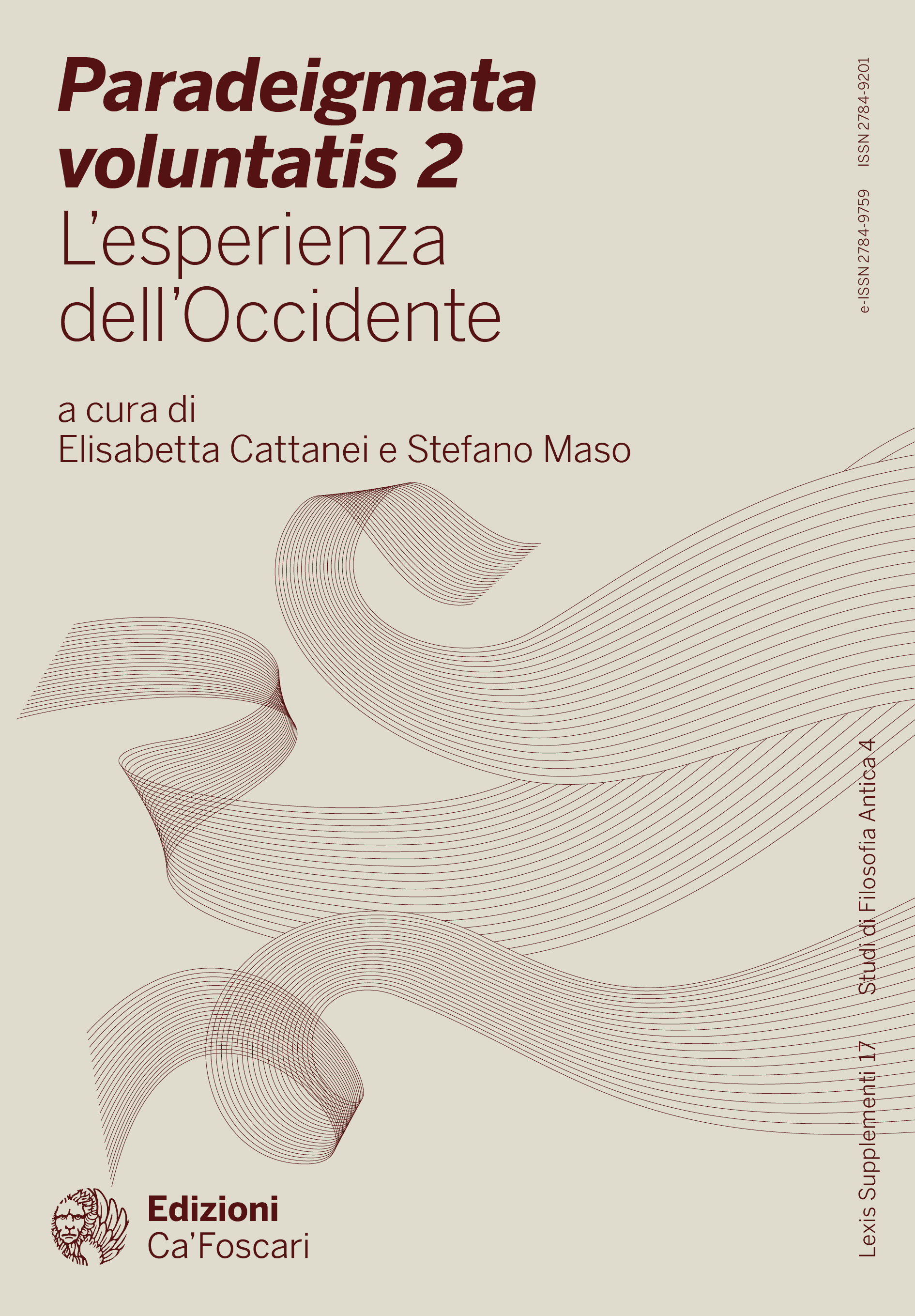
Paradeigmata voluntatis 2
17 Marzo 2025 -
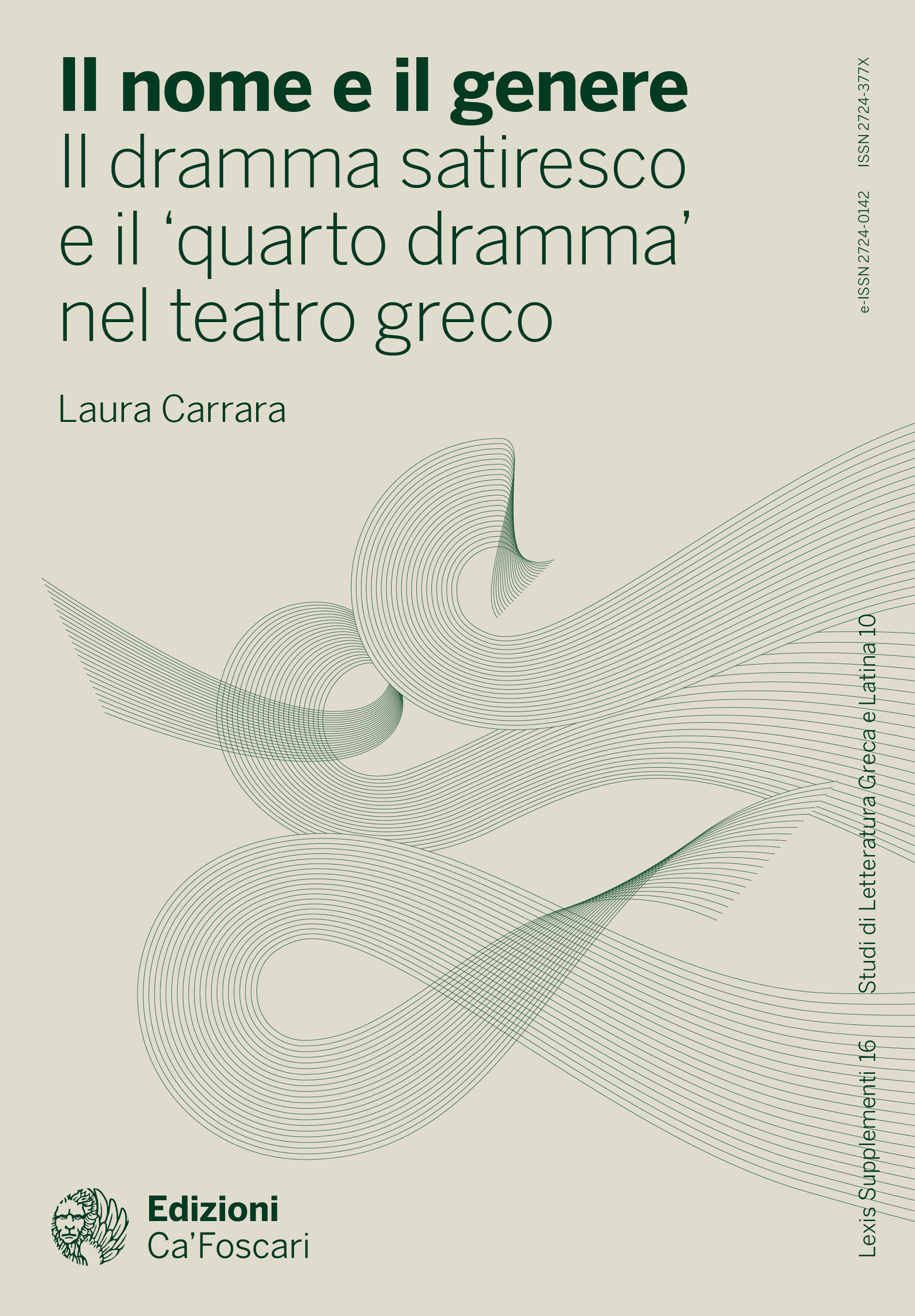
Il nome e il genere
26 Settembre 2024 -
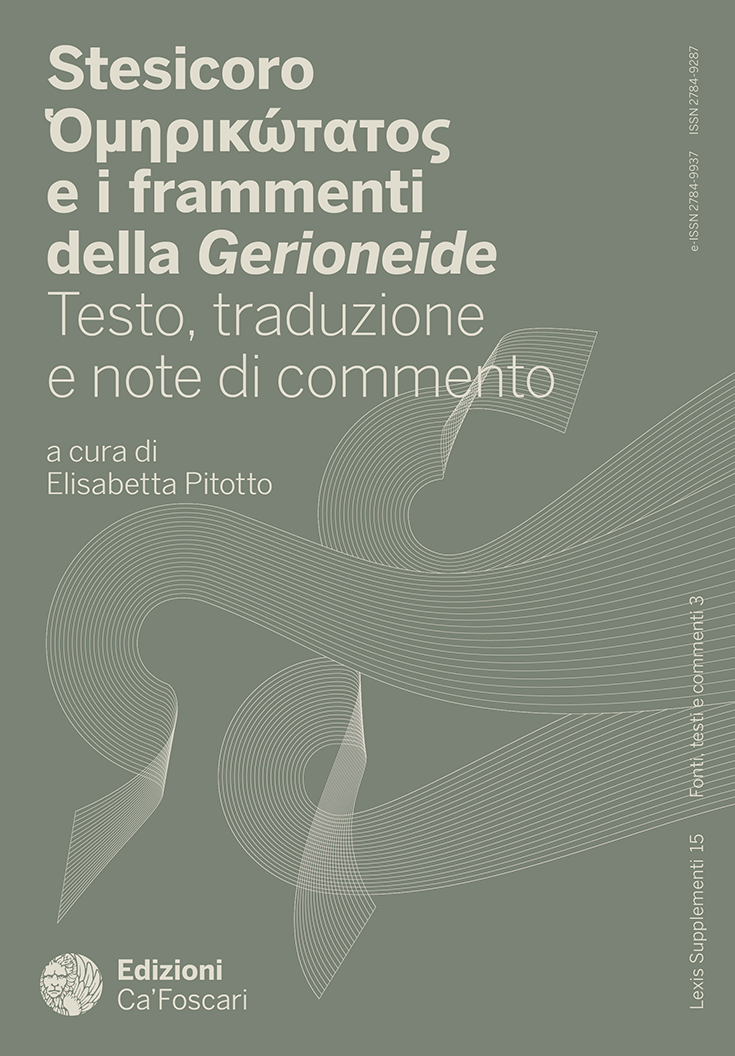
Stesicoro Ὁμηρικώτατος e i frammenti della Gerioneide
07 Giugno 2024 -
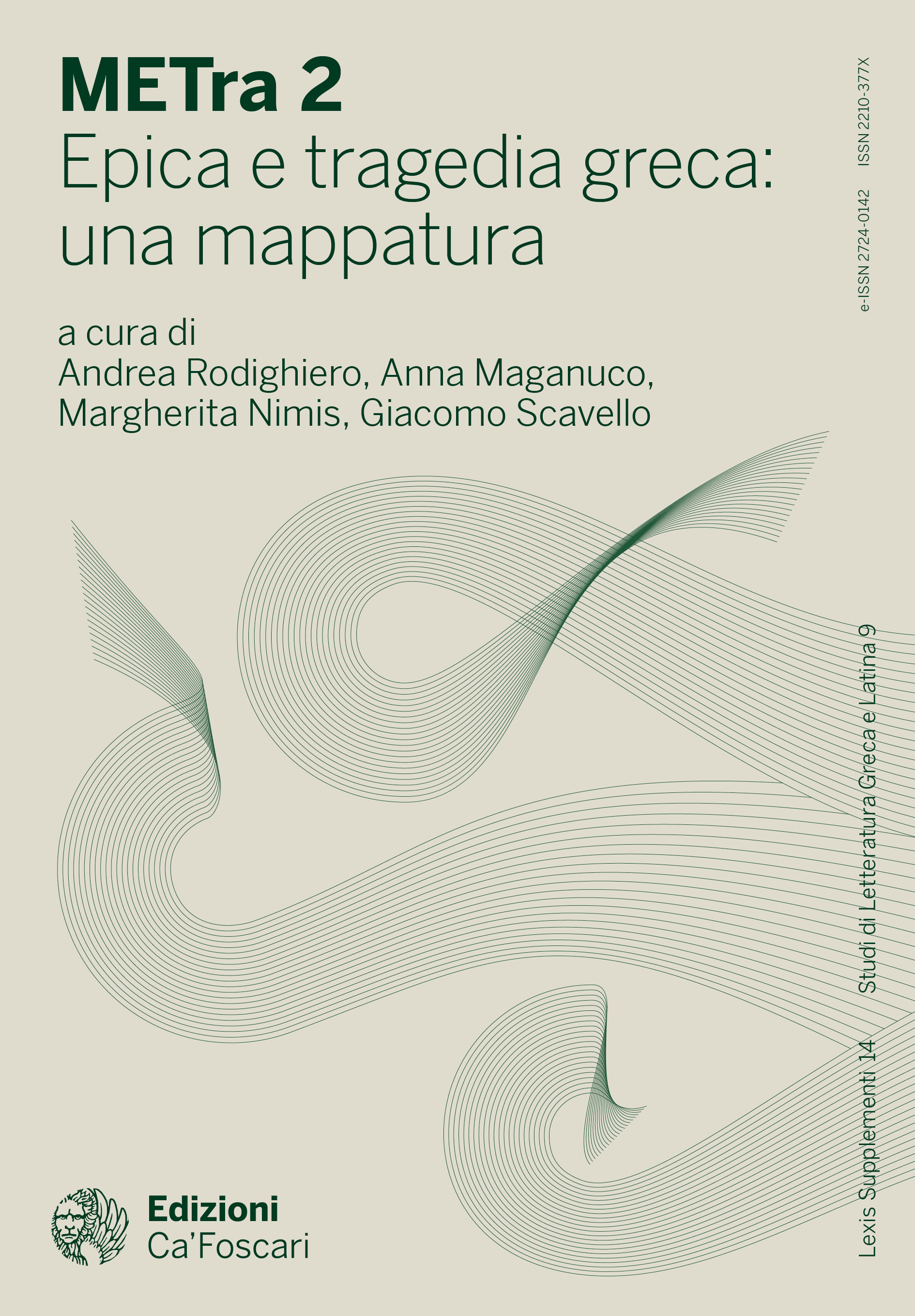
METra 2
21 Dicembre 2023 -
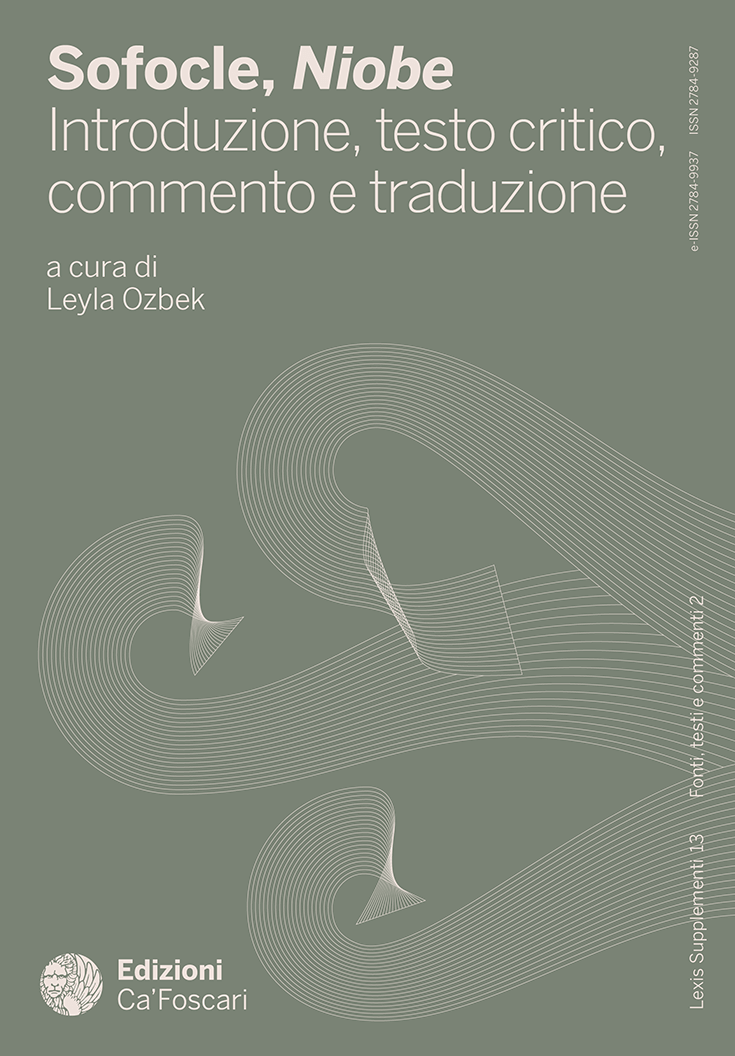
Sofocle, Niobe
20 Dicembre 2023 -

Il mito degli Atridi dal teatro antico all’epoca contemporanea
07 Luglio 2023 -

METra 1
14 Dicembre 2022 -

Agamennone classico e contemporaneo
13 Dicembre 2022 -

Animus. Studio sulla psicologia di Seneca
17 Novembre 2022 -
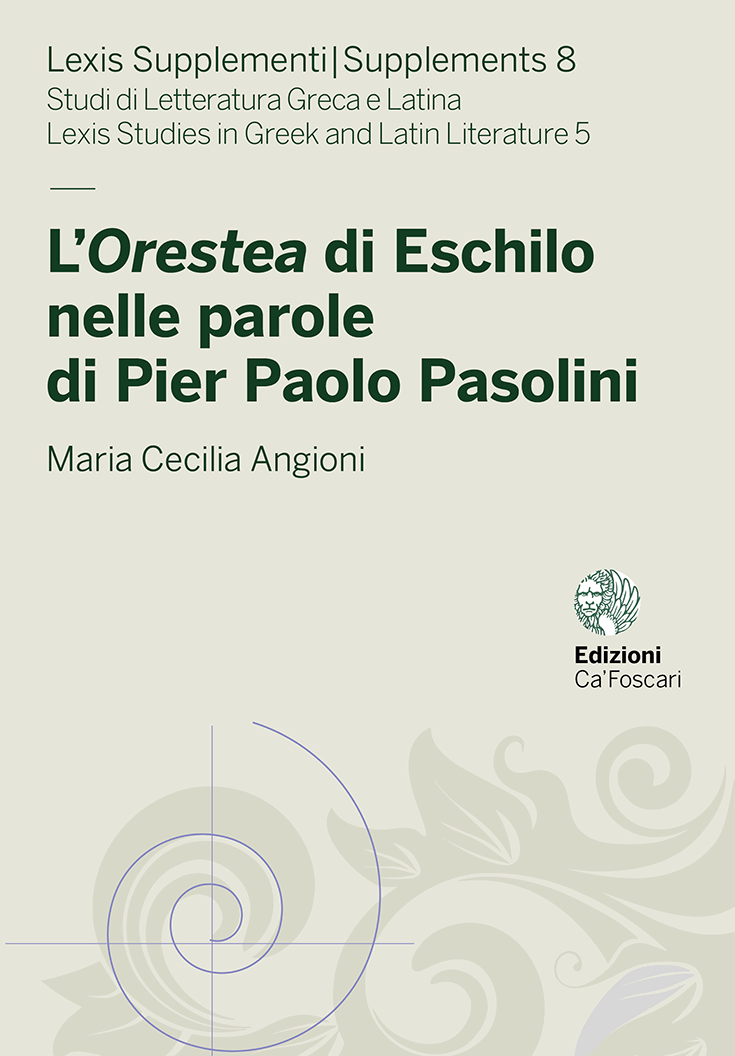
L’Orestea di Eschilo nelle parole di Pier Paolo Pasolini
30 Maggio 2022 -
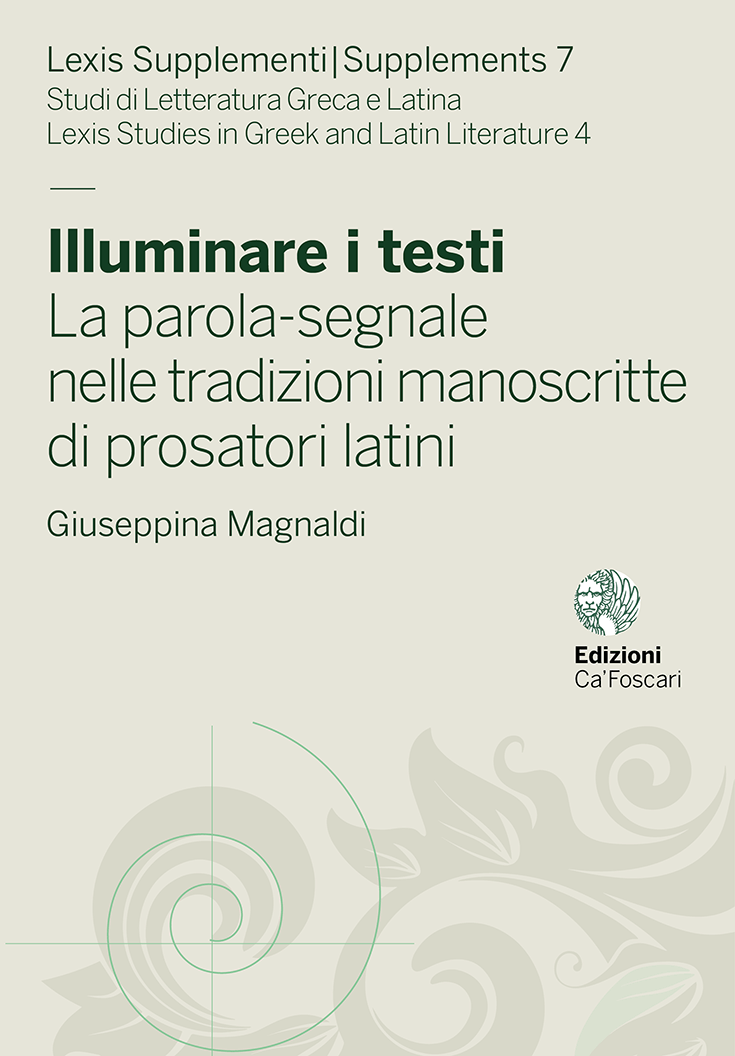
Illuminare i testi
23 Maggio 2022 -
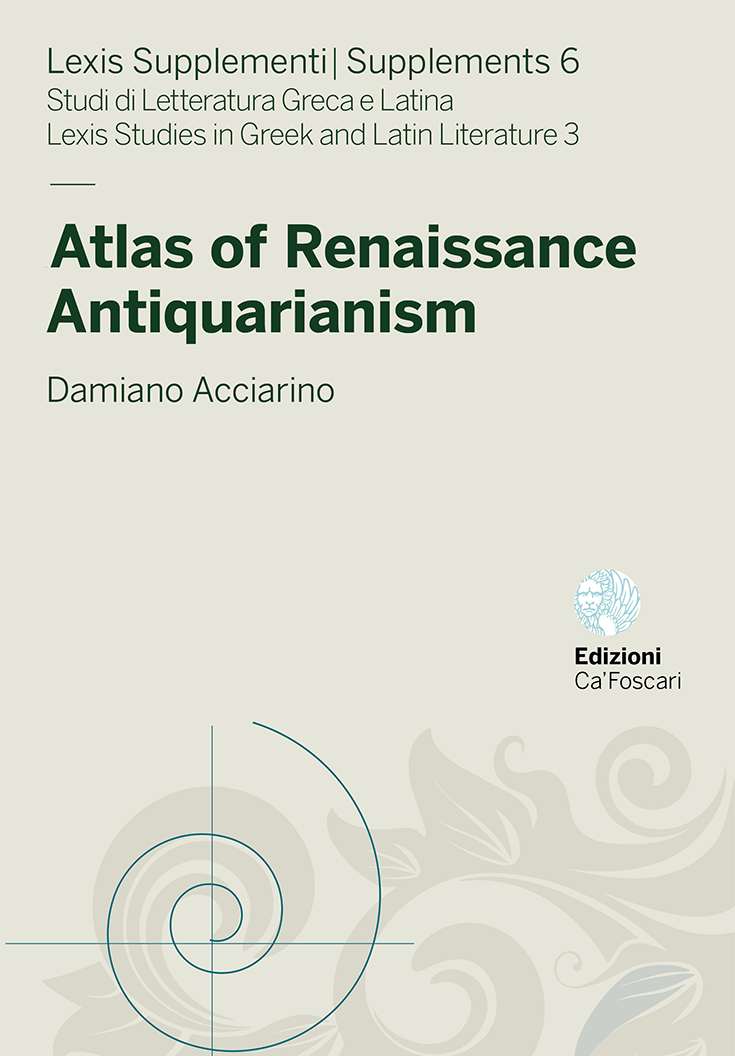
Atlas of Renaissance Antiquarianism
02 Febbraio 2022 -
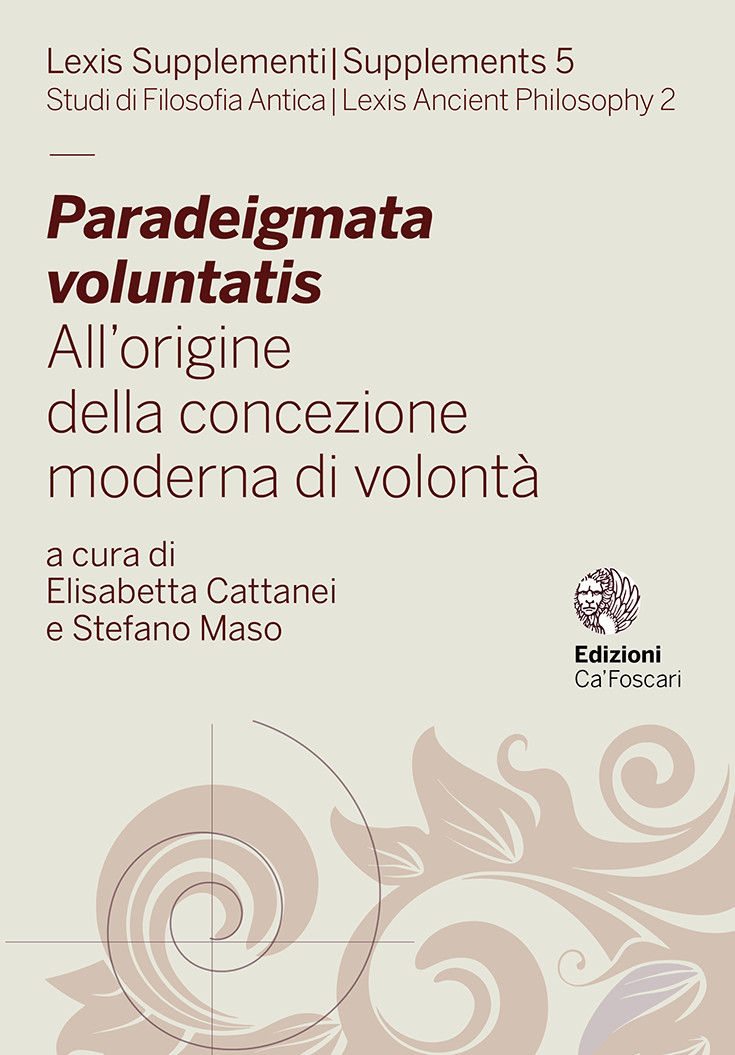
Paradeigmata voluntatis
13 Dicembre 2021 -
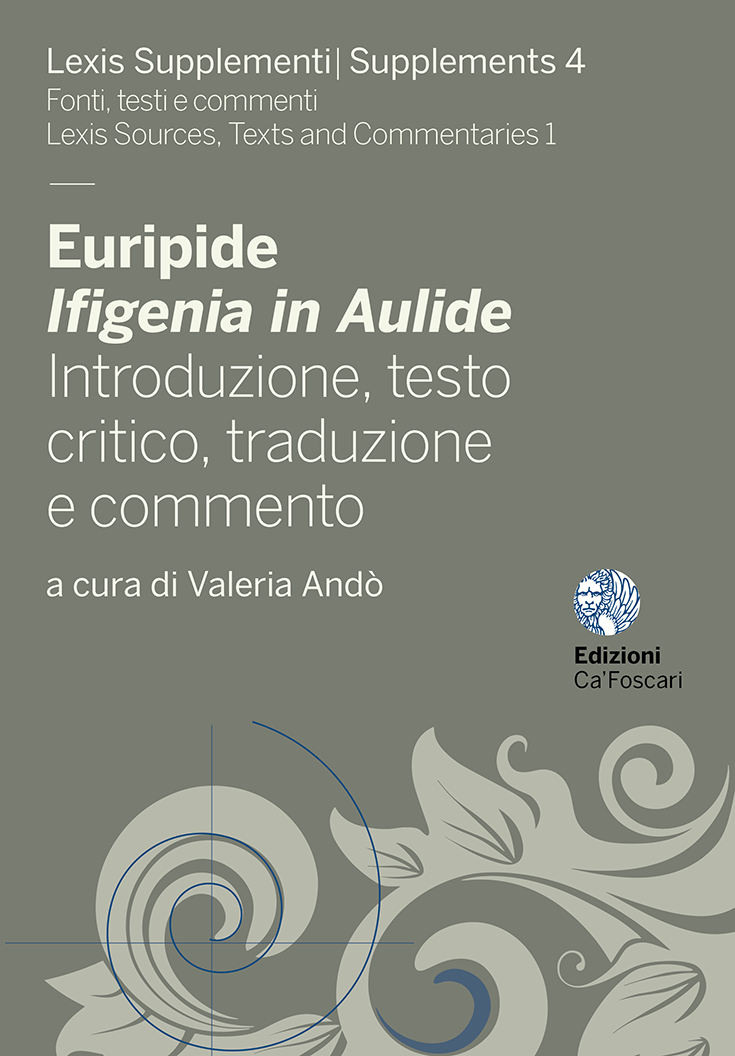
Euripide, Ifigenia in Aulide
21 Maggio 2021 -
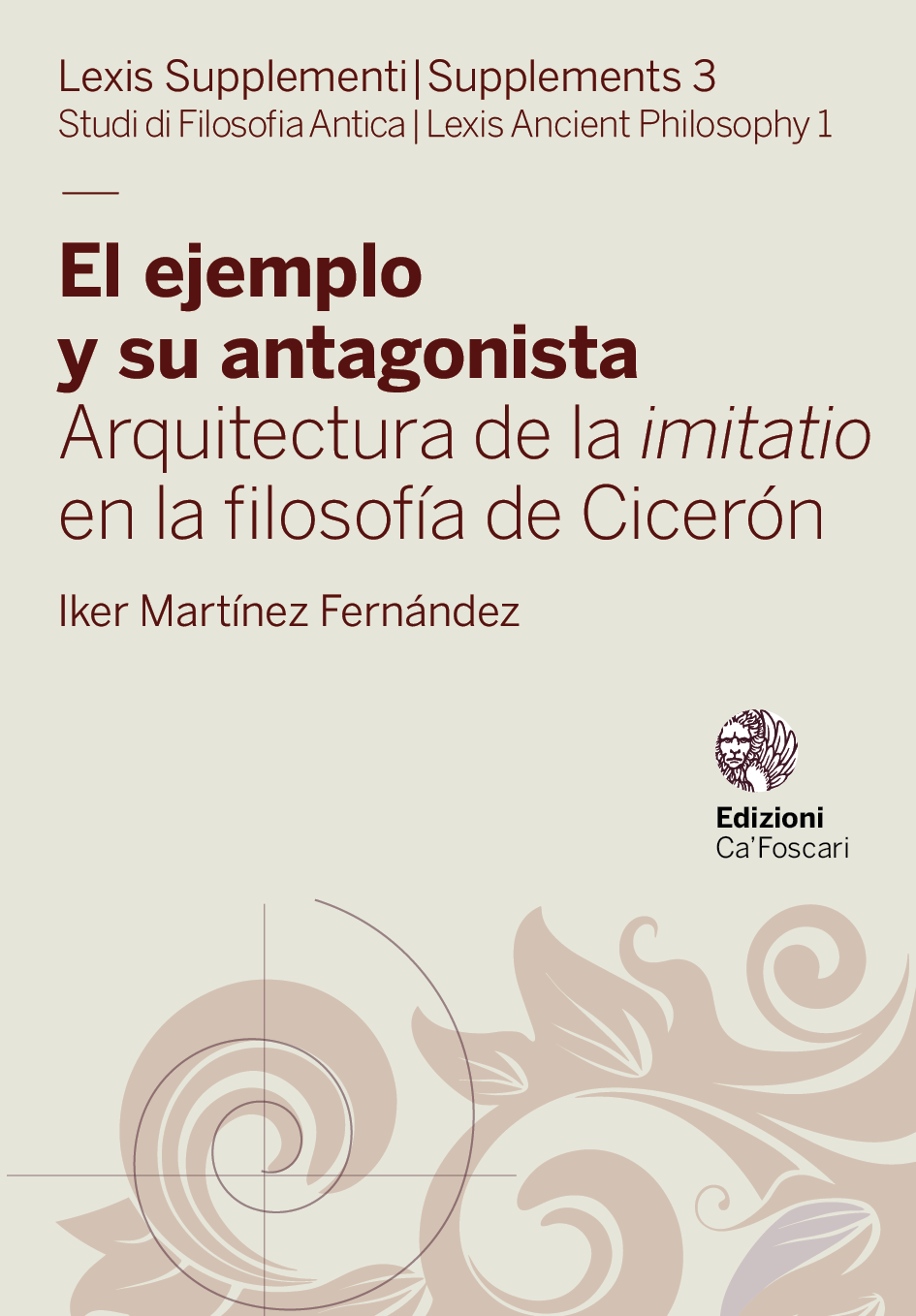
El ejemplo y su antagonista
22 Aprile 2021 -
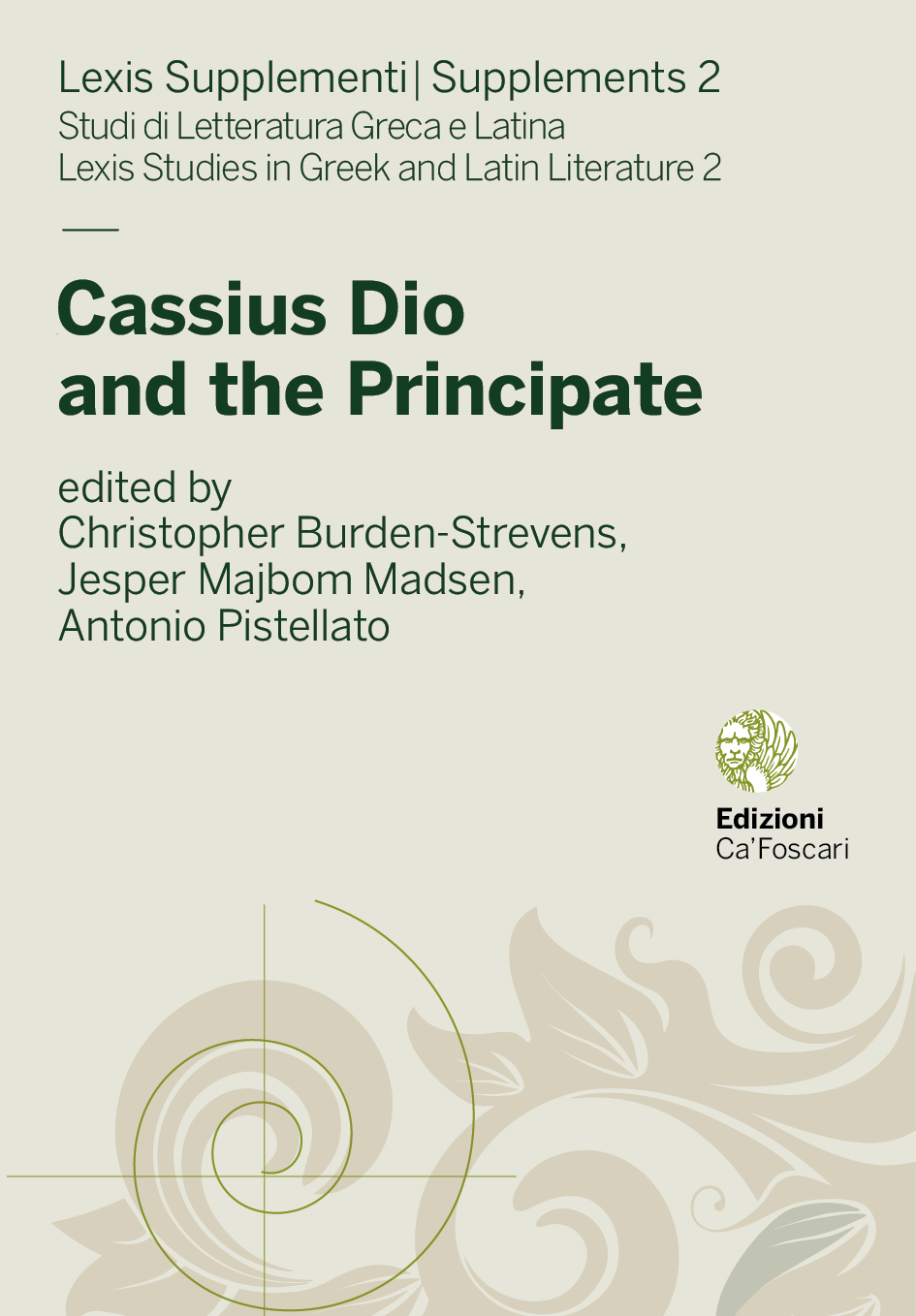
Cassius Dio and the Principate
21 Dicembre 2020 -
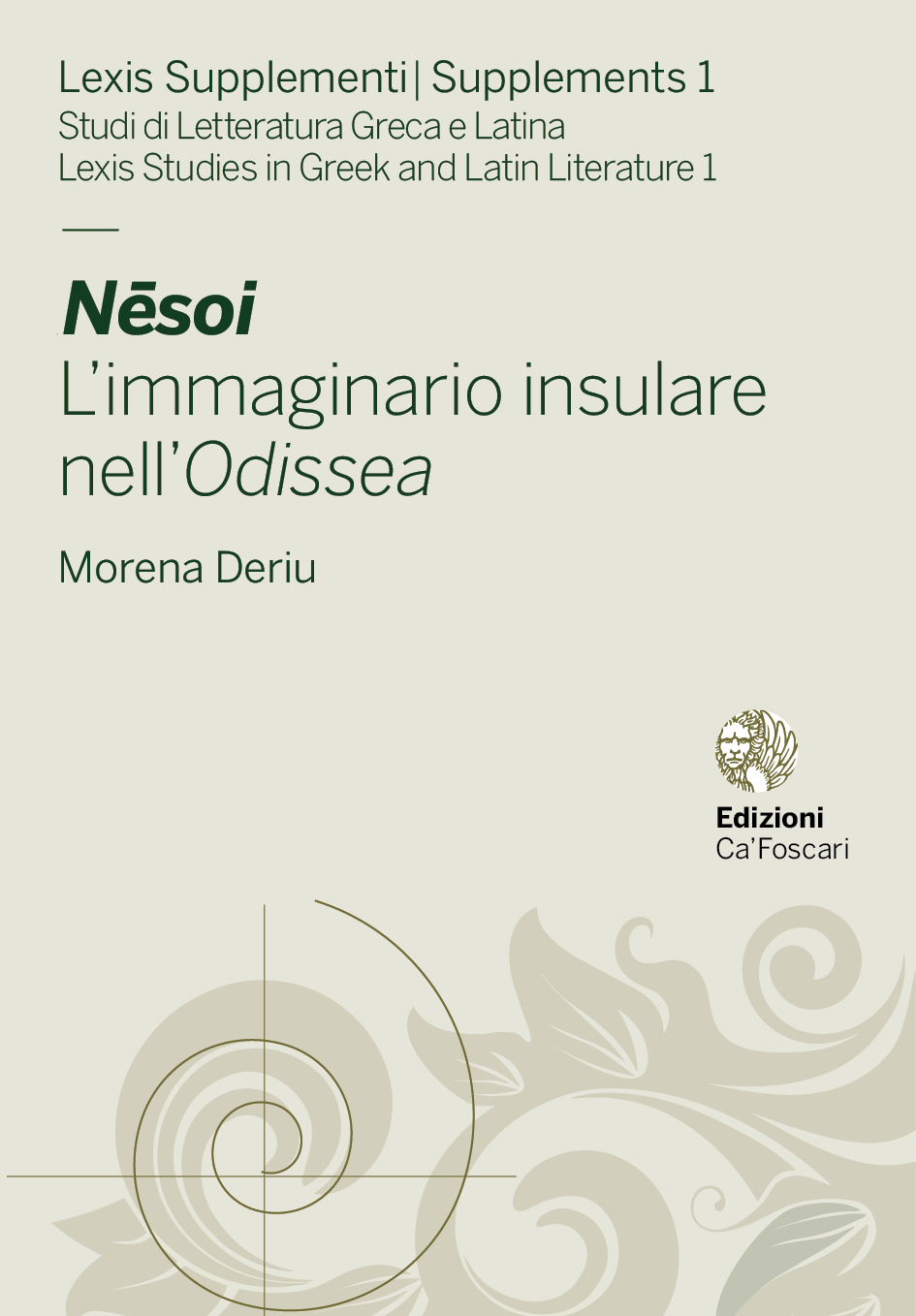
Nēsoi. L’immaginario insulare nell’Odissea
30 Ottobre 2020
Paolo Mastandrea, Università Ca’ Foscari Venezia, Italia
Enrico Medda, Università di Pisa, Italia
Martina Venuti, Università Ca’ Foscari Venezia, Italia
Direttori della sottoserie Studi di Filosofia Antica
Carlos Lévy, Université Paris-Sorbonne, Paris IV, France
Stefano Maso, Università Ca’ Foscari Venezia, Italia
Comitato scientifico della sottoserie Studi di Letteratura Greca e Latina
Giuseppina Basta Donzelli, già Università degli Studi di Catania, Italia
Luigi Battezzato, Scuola Normale Superiore di Pisa, Italia
Riccardo Di Donato, già Università di Pisa, Italia
Paolo Eleuteri, Università Ca’ Foscari Venezia, Italia
Michel Fartzoff, Université de Franche-Comté, France
Alessandro Fusi, Università della Tuscia, Italia
Massimo Gioseffi, Università degli Studi di Milano, Italia
Liana Lomiento, Università degli Studi di Urbino «Carlo Bo», Italia
Giuseppina Magnaldi, già Università degli Studi di Torino, Italia
Silvia Mattiacci, Università degli Studi di Siena, Italia
Giuseppe Mastromarco, già Università degli Studi di Bari «Aldo Moro», Italia
Raffaele Perrelli, Università della Calabria, Italia
Comitato scientifico della sottoserie Filosofia Antica
Douglas Cairns, University of Edinburgh, UK
Walter Cavini, Alma Mater Studiorum Università di Bologna, Italia
Elisabetta Cattanei, Università Cattolica del Sacro Cuore, Milano
Michel Fattal, Université Grenoble Alpes, France
Alain Gigandet, Université Paris-Est, France
Fritz-Gregor Herrmann, Swansea University, UK
Pierre-Marie Morel, Université Paris I – Sorbonne, France
Phillip Mitsis, New York University, USA
Carlo Natali, Università Ca’ Foscari Venezia, Italia
Monte Ransome Johnson, University of California, USA
Gretchen Reydams Schils, Notre Dame University, USA
Emidio Spinelli, Sapienza Università di Roma, Italia
Jula Wildberger, American University of Paris, France
Marco Zingano, Universidade de São Paulo, Brasil
Comitato di redazione
Federico Boschetti, ILC-CNR, Pisa; VeDPH, Università Ca’ Foscari Venezia, Italia
Laura Carrara, Università di Pisa, Italia
Carmela Cioffi, Università Ca’ Foscari Venezia, Italia
Massimo Manca, Università degli Studi di Torino, Italia
Valeria Melis, Università degli Studi di Cagliari; Università Ca’ Foscari Venezia, Italia
Luca Mondin, Università Ca’ Foscari Venezia, Italia
Stefano Novelli, Università degli Studi di Cagliari, Italia
Leyla Ozbek, Università di Pisa, Italia
Giovanna Pace, Università degli Studi di Salerno, Italia
Antonio Pistellato, Università Ca’ Foscari Venezia, Italia
Paolo Scattolin, Università di Verona, Italia
Matteo Taufer, Ricercatore indipendente
Olga Tribulato, Università Ca’ Foscari Venezia, Italia
Per sottoporre una proposta di pubblicazione utilizza il form qui disponibile.
Submit a proposalinput
Dipartimento di Studi Umanistici
Palazzo Malcanton Marcorà
Dorsoduro 3484/D
30123 Venezia
I costi di pubblicazione sono regolamentati dall’Editore. Tutte le informazioni sono disponibili alla pagina Pubblicare con noi.
La Direzione Scientifica della collana è responsabile della selezione dei revisori e del tipo di peer review sulla base delle caratteristiche specifiche del volume proposto. La collana applica tre tipi di peer review: double blind peer review, open peer review e una revisione mista in cui uno dei due revisori è un membro del Comitato Scientifico o della Direzione Scientifica e l’altro è esterno e ‘blind’ (il revisore non conosce l’identità dell’autore e l’autore non conosce l’identità del revisore).
I revisori appartengono a istituzioni di ricerca diverse da quella cui la collana è affiliata.
La valutazione è svolta in conformità e aderenza ai criteri scientifici, e ai criteri editoriali di completezza bibliografica e coerenza formale di Edizioni Ca’ Foscari.
Politiche di revisione per le singole sezioni:
- Volume/Fascicolo completo: peer review
- Introduzioni, prefazioni: senza peer review
- Monografie | Saggi | Articoli: peer review
- Recensioni: no peer review
- Editoriali: no peer review
Per una descrizione dettagliata del processo, si prega di consultare la pagina: Certificazione scientifica.
Avvertenze
I testi che verranno caricati sul portale per il processo di referaggio devono essere rigorosamente anonimi: occorre evitare che qualsiasi elemento contenuto nel corpo del testo o nelle note consenta al revisore di identificare l’autore (ricordarsi di cancellare il proprio nome dalla voce ‘autore’ nelle proprietà del file).
Ogni testo deve essere corredato di cinque (5) parole chiave (keywords) e di un riassunto (abstract) in inglese della lunghezza massima di 700 caratteri spazi inclusi.
Note: esclusivamente a piè di pagina. Si cita secondo il sistema anglosassone Nome-Anno (vd. sotto).
Font greco: si deve impiegare inderogabilmente un font Unicode.
I numeri di versi e pagine devono essere abbreviati: es. 345-7.
Autori moderni: nel testo i nomi di battesimo costantemente in forma abbreviata: ad es. S. Panciera, P. Mastandrea. Non va lo spazio fra i doppi nomi abbreviati: es. M.L. West e non M. L. West. Per i rinvii interni si usi la citazione sul modello anglosassone, con numeri abbreviati (Nome-Anno: ad. es. Wilamowitz 1914, 115-26).
Caratteri
Il carattere di base è il tondo.
Le locuzioni in latino nel testo vanno in corsivo (comprese parole come infra e supra) eccetto che nei casi in cui si tratta di citazione da opera moderna dove il testo va in tondo tra caporali (« »).
Le parole straniere in grafia originale non entrate nell’uso comune vanno in corsivo: ad es. Leitmotiv, Wortstellung.
Le locuzioni in carattere greco non vanno mai in corsivo.
Abbreviazioni più comuni:
- Confronta: cf.
- Seguente/i: s./ss.
- Appendice: app.
- Articolo/i: art./artt.
- Capitolo/i: cap./capp.
- Colonna/e: c./cc.
- Eccetera: ecc. o etc.
- Editore/i: ed./edd.
- Edizione/i: ed./edd.
- Esempio/i: es./ess.
- Exempli gratia: e.g.
- Linea/e: l./ll.
- Luogo/hi citato/i: l.c./ll.cc.
- Manoscritto/i: ms./mss.
- Nota/e: nota/note
- Numero/i: nr./nrr.
- Paragrafo/i: par./parr. [si usi tuttavia, se possibile, il segno convenzionale §]
- Scholium ad locum: schol. ad l.
- Scholium ad locum laudatum: schol. l.c.
- Sezione/i: sez./sezz.
- Sub voce/ibus: s.v./s.vv.
- Supplemento: suppl.
- Tavola/e: tav./tavv.
- Traduzione/i: trad./tradd.
- Varia/e lectio/nes: v.l./vv.ll.
- Verso/i: v./vv.
- Volume/i: vol./voll.
Per opere, manuali, dizionari, enciclopedie, strumenti di larga consultazione si usino citazioni abbreviate in corsivo: ad esempio RE, GH, ThlL, LSJ.
Autori antichi:
- all’interno di una citazione si usi il punto: es. Hor. carm. 1.2.4.
- fra una citazione e l’altra di uno stesso autore si usino virgola e spazio: es. Ov. ars 1.27, 3.48, met. 10.149-51, 158
- fra citazioni di autori diversi si usi il punto e virgola: es. Verg. Aen. 3.250, 446; Hor. carm. 1.2, 4, 1.4.1, 27.
Le citazioni seguono le abbreviazioni date dal ThlL per il latino (es. Hor. ars e non Ars) e da LSJ per il greco (vedi deroghe nella sezione qui di seguito).
Abbreviazioni in deroga a LSJ:
Aesch. non A. → Aesch. Suppl. Sept. Pers. PV Ag. Ch. Eum.
Soph. non S. → Soph. Ai. El. OT Ant. Tr. Phil. OC
Eur. non E. → Eur. Cycl. Alc. Med. Her . Hipp. Andr . Hec. Suppl. HF Ion Tro. IT El. Hel. Pho. Or. Ba. IA Rh.
Aristoph. non Ar. → Aristoph. Ach. Eq. Nub. Vesp. Av. Pax Lys. Thesm. Ran. Eccl. Pl.
Bacch. non B.
Dem. non D.
Pind. non Pi. → Pind. Pyth. Ol. Isth. Nem.
Thuc. non Th.
Xen. non X.
Papiri:
Si usi il corsivo: P. Oxy.
Riviste:
I nomi delle riviste vanno in corsivo; non vanno tra virgolette. Si adottino in linea generale le abbreviazioni dell’Année Philologique. I nomi delle riviste non comprese nell’Année Philologique si scrivano per esteso.
BIBLIOGRAFIA FINALE E ABBREVIAZIONI BIBLIOGRAFICHE IN NOTA
Libri:
Parker, R. (1983). Miasma: Pollution and Purification in Early Greek Religion. Oxford: Oxford University Press.
Radt, S.L. (1977). Tragicorum Graecorum fragmenta. Vol. 4, Sophocles. Göttingen: Vandenhoek & Ruprecht.
Krumeich, R.; Pechstein, N.; Seidensticker, B. (Hrsgg) (1999). Das griechischen Satyrspiel. Darmstadt: Wissenschaftliche Buchgesellschaft.
Articoli in rivista:
Boardman, J. (1975). «Herakles, Peisistratos and Eleusis». JHS, 95, 1-12.
Armstrong, D.; Hanson, A.E. (1987). «The Virgin’s Voice and Neck. Aeschylus, Agamemnon 245 and Other Texts». BICS, 33, 97-100.
Contributi in volumi:
Harvey, D. (2005). «Tragic Thrausmatology: The Study of the Fragments of Greek Tragedy in the Nineteenth and Twentieth Centuries». McHardy, F.; Robson, J.; Harvey, D. (eds), Lost Dramas of Classical Athens: Greek Tragic Fragments. Exeter: Liverpool University Press, 328-61.
Nelle note si utilizzeranno le abbreviazioni bibliografiche nome anno, secondo questi esempi:
Parker 1983, 254-7; Harvey 2005, 328; Krumeich, Pechstein, Seidensticker 1999, 25-30.
Per un elenco completo delle norme redazionali, si prega di visitare la pagina ‘Norme redazionali’.
Ethical Code of Lexis Supplements
Lexis Supplements is a peer-reviewed scientific book series whose policy is inspired by the COPE (Committee on Publication Ethics) Ethical Code.
Publisher’s responsibilities
The Publisher must provide the Book Series with adequate resources and the guidance of experts, in order to carry out its role in the most professional way, aiming at the highest quality standard.
The Publisher must have a written agreement that defines the relationship with the owner of the Book Series and/or the Editor-in-Chief. The agreement must comply with the Code of Behavior for Publishers of Scientific Journals, as established by COPE.
The relationship among the Editor-in-Chief, the Advisory Board and the Publisher is based on the principle of publishing independence.
Editors’ responsibilities
The Editor-in-Chief and the Advisory Board of Lexis Supplements alone are responsible for the decision to publish the submitted works.
Submitted works, after having been checked for plagiarism by means of the anti-plagiarism software Compilatio that is used by the University and is made available to us, will be sent to at least two reviewers. Final acceptance presumes the implementation of possible amendments, as required by the reviewers and under the supervision of the Lexis Supplements Editor-in-Chief.
The Lexis Supplements Editor-in-Chief and Advisory Board must evaluate each submitted paper in compliance with the Book Seriesʼ policy, i.e. exclusively on the basis of its scientific content, without discrimination of race, sex, gender, creed, ethnic origin, citizenship, or the scientific, academic and political position of the Authors.
Allegations of misconduct
If the Lexis Supplements Editor-in-Chief and Advisory Board notice (or receive notifications of) mistakes or inaccuracies, conflict of interest or plagiarism in a published book, they will immediately warn the Author and the Publisher and will undertake the necessary actions to resolve the issue. They will do their best to correct the published content whenever they are informed that it contains scientific errors or that the authors have committed unethical or illegal acts in connection with their published work. If necessary, they will withdraw the book or publish a recantation.
All complaints are handled in accordance with the guidelines published by the COPE.
Concerns and complaints must be addressed to the following e-mail ecf_support@unive.it. The letter should contain the following information:
- complainant’s personal information;
- title, author(s), publication date, DOI;
- complaint(s);
- declaration that the complainant has no conflict of interest, or declaration of an actual or potential conflict of interest.
Authors’ responsibilities
Stylesheet
Authors must follow the Guidelines for Authors to be downloaded from the Lexis Supplements website.
Authors must explicitly state that their work is original in all its parts and that the submitted paper has not been previously published, nor submitted to other publishers, until the entire evaluation process is completed. Since no paper or book gets published without significant revision, earlier dissemination in conference proceedings or working papers does not preclude consideration for publication, but Authors are expected to fully disclose publication/dissemination of the material in other closely related publications, so that the overlap can be evaluated by the Lexis Supplements Editor-in-Chief.
Authorship
Authors are strongly encouraged to use their ORCID iD when submitting a manuscript. This will ensure the authors’ visibility and correct citation of their work.
Authorship must be correctly attributed; all those who have given a substantial contribution to the design, organisation and accomplishment of the research the book is based on, must be indicated as Co-Authors. Please ensure that: the order of the author names is correct; the names of all authors are present and correctly spelled, and that affiliations are up-to-date.
The respective roles of each co-author should be described in a footnote. The statement that all authors have approved the final version should be included in the disclosure.
Conflicts of interest and financing
Authors, under their own responsibility, must avoid any conflict of interest affecting the results obtained or the interpretations suggested. The Lexis Supplements Editor-in-Chief will give serious and careful consideration to suggestions of cases in which, due to possible conflict of interest, an Author’s work should not be reviewed by a specific scholar. Authors should indicate any financing agency or the project the book stems from.
Quotations
Authors must see to it that all works consulted be properly quoted. If works or words of others are used, they have to be properly paraphrased or duly quoted. Quotations between “double quotes” (or «angled quotation marks» if the text is written in a language other than English) must reproduce the exact wording of the source; under their own responsibility, Authors should carefully refrain from disguising a restyling of the source’s wording, as though it was the original formulation.
Any form of excessive, inappropriate or unnecessary self-citation, as well as any other form of citation manipulation, are strongly discouraged.
Ethical Committee
Whenever required, the research protocols must be authorised in advance by the Ethical Committee of Ca’ Foscari University of Venice.
Emendations
When Authors find a mistake or an inaccuracy in their own work, they must immediately warn the Lexis Supplements Editor-in-Chief, providing all the information needed to make the due adjustments.
Reviewers’ responsibilities
Goal
By means of the peer-review procedure, reviewers assist the Lexis Supplements Editor-in-Chief and Advisory Board in taking decisions on the submitted works. They are expected to offer the Authors suggestions as to possible adjustments aimed at improving their contribution submission.
Timing and conflicts of interest
If a reviewer does not feel up to the task of doing a given review, or if she/he is unable to read the work within the agreed schedule, she/he should notify the Lexis Supplements Editor-in-Chief. Reviewers must not accept texts for which there is a conflict of interest due to previous contributions or to a competition with a disclosed author (or with an author they believe to have identified).
Confidentiality
The content of the reviewed work must be considered confidential and must not be used without explicit authorisation by the Author, who is to be contacted via the editor-in-chief. Any confidential information obtained during the peer review process should not be used for other purposes.
Collaborative attitude
Reviewers should see themselves not as adversaries but as advocates for the field. Any comment must be done in a collaborative way and from an objective point of view. Reviewers should clearly motivate their comments and keep in mind the Golden Rule of Reviewing: “Review for others as you would have others review for you”.
Plagiarism
Reviewers should report any similarity or overlapping of the work under analysis with other works known to them.
